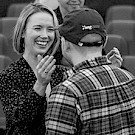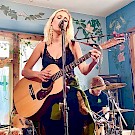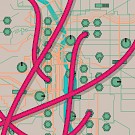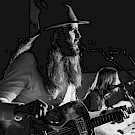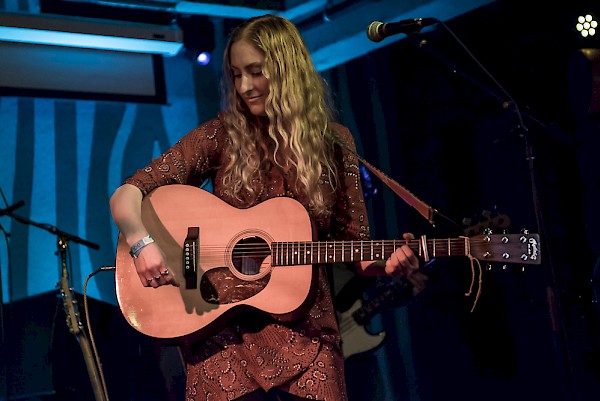 Laryssa Birdseye at the Doug Fir in April—click to see more photos by Miss EllaneaAs soon as you begin to listen to Laryssa Birdseye’s debut record, her voice and lyrical talent grab you and don’t let you go. Birdseye has proven herself a master of lyricism, blending her talents in such a perfect way that the listener sees straight into her mind and emotions.
Laryssa Birdseye at the Doug Fir in April—click to see more photos by Miss EllaneaAs soon as you begin to listen to Laryssa Birdseye’s debut record, her voice and lyrical talent grab you and don’t let you go. Birdseye has proven herself a master of lyricism, blending her talents in such a perfect way that the listener sees straight into her mind and emotions.
So What? is a masterpiece of songwriting from a powerful voice that Portland is proud to call its own. Birdseye opens up every aspect of herself within the album, and in doing so, guides us through our own struggles and heartbreaks. On the tail of its release on September 16, Vortex talked to Birdseye about how songwriting has helped her in her own struggles, and what she hopes So What? can do for others.
Congratulations on releasing such an amazing debut! What was the experience of recording your first full-length like for you?
Thank you! It was an incredibly challenging experience. The record began when I brought my song notebook into the studio with Jeanot Lewis-Rolland two years ago. The idea was for me to play all of the songs I had written that I thought were decent enough to be recorded, and then he and I would decide what would fit best. I was so nervous sharing the songs that I brought in a six pack of beer with me and progressively got drunk as I went through the session. I think I even offered him a few and ended up drinking his out of pure anxiety. When I began the recording process, I was painfully shy and incredibly protective of my songs. I held on to them for so long because I never really knew if I wanted anyone to hear them. Throughout the two years we spent working on So What?, I really came into my own in terms of being confident about the music. The intimacy of these songs was difficult for me to share initially, but now I feel like it’s a strength. I’m definitely an over-sharer now.
The whole album has a very polished feel, and brings to mind many other strong female songwriters and artists. What artists inspired you in the beginning of your career and on this record in particular?
 I’ve always been very drawn to strong female writers and vocalists. I listened to a lot of Cat Power, Ani DiFranco and Mirah in high school, and I loved that they didn’t adhere to a traditional songwriting structure. Glen Hansard was another one of my absolute favorites. They made me feel sad as hell, and in that sadness I felt unified with whatever they were going through. It made me feel like I wasn’t alone in all of my darkness, and that was very powerful to me. This record I feel was inspired very much by Amy Winehouse in terms of lyrical content. I’ve always felt like there were a lot of parallels between us—the eating disorder that ravaged her, the drinking, the toxic relationships, the very public unraveling as she lost her battle with her addiction were things I faced (on a less public level) and had a very different outcome with. She put a lot of her personal life into her music which was why she was magical to so many. We could relate to her. Adele was another artist that had a big influence on me. Her album 21 was always on in my early 20s, and I loved the idea of taking a heartbreak and triumphing over it through song.
I’ve always been very drawn to strong female writers and vocalists. I listened to a lot of Cat Power, Ani DiFranco and Mirah in high school, and I loved that they didn’t adhere to a traditional songwriting structure. Glen Hansard was another one of my absolute favorites. They made me feel sad as hell, and in that sadness I felt unified with whatever they were going through. It made me feel like I wasn’t alone in all of my darkness, and that was very powerful to me. This record I feel was inspired very much by Amy Winehouse in terms of lyrical content. I’ve always felt like there were a lot of parallels between us—the eating disorder that ravaged her, the drinking, the toxic relationships, the very public unraveling as she lost her battle with her addiction were things I faced (on a less public level) and had a very different outcome with. She put a lot of her personal life into her music which was why she was magical to so many. We could relate to her. Adele was another artist that had a big influence on me. Her album 21 was always on in my early 20s, and I loved the idea of taking a heartbreak and triumphing over it through song.
You describe yourself as "a folk singer that accidentally wrote pop." What type of music did you begin writing and when did it transform into what it is now?
When I first began writing, I was putting poetry to song. It wasn’t very good, but I think it laid the stage for the type of songwriter I became. I definitely didn't adhere to a popular writing structure. Some songs didn’t have choruses, some were seven minutes long, but they were all real. I got out exactly what I needed in them. It was, I suppose, confessional folk music. Kind of the mood of Anne Sexton with a Joan Baez vibe, if that makes sense. I think I began to write a little more structured when I began playing with other musicians. It became a new challenge for me to write with more of a pop structure while also trying to stay away from cliches and not be obnoxious.
I want to talk about the songwriting on this album, and your writing in general. It's really the star of the show, and your talents in lyricism do not go unnoticed. These lyrics hit very personal places for you. Having struggled with addiction and eating disorders, how has writing music helped you escape that past?
Honestly, there was a time when I was only honest in my music. In my mid teens and early 20s, I was tormented with trying to uphold a normal, healthy front while also falling the fuck apart at the same time. It was exhausting, and it took a toll on me. I found solace in writing songs where I could actually say what I meant, not sugar coat anything, and find a bit of clarity. I think it has become incredibly empowering for me to share these songs that were written in the thick of my worst times and say “Hey, I went through these things and I’m still here, still standing.” It’s my hope to be able to reach people that are struggling with the same things and be an example that things can be better.
"Haunt" is a definite standout on the album. From the very first line, "Every song I write is about you / So every song I write is a lie." It grabs your attention. Do all your songs tend to revolve around this one particular individual? Did writing this song help you gain perspective on the relationship?
"Haunt" is one of my favorite songs on the album as well. Not every song on the album is about that particular person, but there was a time when every single song I wrote was about him. And it was awful. I was still so much in love with him, but the relationship was ruined beyond repair and we were not speaking. I felt like I was reaching out to someone that wasn’t there, almost like he had died. I felt like I was haunted. Not by him, but by the memory of him, something that didn’t exist anymore. After writing "Haunt," I actually did begin to feel some peace around the relationship. I began to let go of that memory.
"Done For" is another standout, and you've said it was a difficult song to release. The lyrics in it are brutally honest, and somewhat dark. There's also a heavy blues and gospel influence evident in your delivery. How did this track come together?
I wrote "Done For" after half a bottle of whiskey in the midst of a terrible, gripping depression. I never write drunk, and this is probably the only exception. It’s a song that’s reaching out for retribution, pleading for something else, something better. The gospel element was always there. When I was in college, I sang in a gospel choir and felt like it was kind of where my voice felt most at home. When Jeanot heard the song, he loved it, and I was so uncomfortable with the subject matter and actually putting it out there in the world, that we clashed about it for a while. He pushed for it, and I hated it. It took a while (and a lot of whiskey) to get the unpolished, raw vocal take you hear on the album. I needed to move past my self-consciousness and just let that darkness take over.
The trajectory of the songs on this album is quite ingenious. Moving from songs rooted deeply in sadness and struggles, it then ends with "Not Your Girl," "Spark," and the title track "So What," which are more uplifting songs about healing, being comfortable with yourself and moving on. Did you write this album with this concept in mind, or did it all come together later in the process?
It’s funny because that was not the initial intention with the album. It was supposed to be just an EP, but when I began the process of recording, I just started writing and couldn’t stop. "Spark," "Not Your Girl" and "So What" were songs I did end up writing later, after I had begun much of my healing around old heartbreaks and failures that I let define me. It became almost a concept album based around the falling in love, having it blow up in your face, the depression you go through, and then eventually making it to the other side. I love “So What” as a track because it’s a very real take on all of what I went through. The attitude of “Yeah, I’ve been a fucking mess, so what?” has been really great to possess. I feel like it’s a superpower I have now. I know nothing can take me as low as I’ve been, and that’s amazing to know. I’m not ashamed of anything, and I think this album shows that.
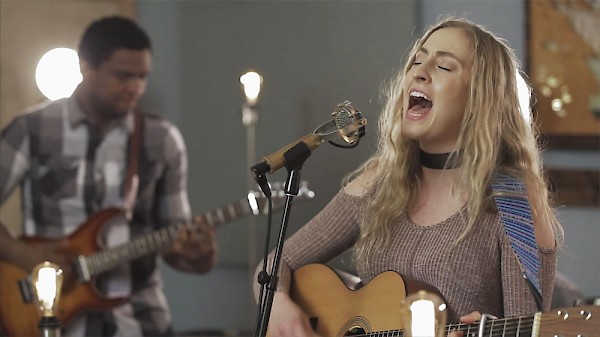 Laryssa Birdeye during a live session at The Rye Room—click to see a video of the performanceAs much of this album touches very personal subjects for you, how has 'So What?' helped you? And what do you hope your listeners take from the album's message?
Laryssa Birdeye during a live session at The Rye Room—click to see a video of the performanceAs much of this album touches very personal subjects for you, how has 'So What?' helped you? And what do you hope your listeners take from the album's message?
So What? has helped me learn how to fly, and how to be honest. If you’re honest about your struggles, you stop living in shame. When I was in an abusive relationship and avoiding my friends and family to cover for him, because I was so ashamed of being stuck in it, I dug myself a deep hole that I had to dig myself out of. And when you spend all that time in the mud digging, you don’t come out clean. You’re a fucking mess when you get out. If you pretend you’re perfect, that you’re whole when you’re not, you’re living a lie. I’m still learning to be the most authentic person that I can be. I’m a perfectionist and a control freak, two things that most addicts are, and to release a 12-track album that details just what a mess I’ve been was really hard for me, but I feel liberated in doing so. I hope anyone that listens to that is inspired by that. I hope anyone that hears this that’s in a dark place can feel a little less alone.
If you had to choose one song from the record that you feel hits closest to home for you, what song would you choose and why?
"So What" is probably the song that stays the most relevant to me. I wrote it after a long period of time that I felt uninspired, and it came out as this brutally honest, self-reflective and triumphant “what the fuck ever” kind of song. I think it’s my anthem. That line about the voices in my head at the end still makes me happy. “Been listening to the voices in my head, they tell me I’m not finished yet.” I still feel that more than ever. I feel like I’ve weathered a great storm and am just beginning. I feel unstoppable.

